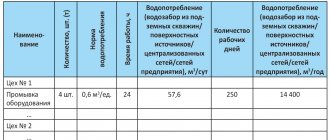Homeowners are required to pay utility bills in accordance with the Housing Code of the Russian Federation. If they are not paid on time, liability will follow for failure to comply with the law in the form of penalties or suspension or restriction of the provision of utility services. And in some cases, legal proceedings may be opened against the property owner. Currently, this issue is relevant - last year, due to the coronavirus pandemic, it was decided to introduce a moratorium on the calculation of penalties for late payment of housing and communal services until the end of 2021. But from January 1, 2021, management companies, homeowners associations and resource providers have the right to charge a penalty.
Payment rules for housing and communal services
The obligation of the homeowner or tenant to pay for the provided housing and communal services is stated in Article 153 of the Housing Code of the Russian Federation and in subparagraph “i” of paragraph 34 of the Rules, approved by Decree of the Government of the Russian Federation of December 26, 2016 No. 354.
Payment must be made on time and in full
. The deadline for paying the fee is determined in accordance with the management agreement of the apartment building or the decision of the general meeting of members of the housing cooperative.
If the deadline is not specified in these documents, then the homeowner must pay the cost of housing and communal services no later than the 10th day of the month following the expiration. This condition is specified in Part 1 of Article 155 of the RF Housing Code.
Responsibility for late payment of services
For late or incomplete payment of the calculated cost of consumed housing and communal services, the homeowner can be punished in two ways:
- charge a penalty;
- suspend or restrict the provision of services.
In addition, the management company, homeowners association or resource provider has the right to go to court if the subscriber does not want to voluntarily pay the debt.
Penalties can only be charged on the amount of the resulting debt. According to paragraph 118 of the Rules approved by Decree of the Government of the Russian Federation dated December 26, 2016 No. 354, debt is recognized as incomplete payment for housing and communal services provided in an amount exceeding the sum of two monthly payments according to established standards
. That is, if the subscriber missed 1 month, then he is not yet recognized as a debtor.
The order of repayment of utility bills
Many debtors are interested in the question of the order in which debts for housing and communal services are repaid and by what rule it is established.
Thus, Article 319 of the Civil Code of the Russian Federation states that when repaying a debt, the following sequence must be observed:
- lender costs;
- interest charges;
- amount of debt.
Based on the above, it can be assumed that when paying off debts for housing and communal services, you first need to pay a penalty, and then the principal amount. However, this approach is considered incorrect. The fact is that utility bills in most cases are costs for the management company, since it is settled with the resource-supplying organization using internal reserves.
The owner of the premises must first return the main debt for housing and communal services, and then pay a penalty.
In addition, if in any month the amount of payment for a specific utility service exceeds 25% of the amount accrued for the same period last year, then the debtor has the right to receive an installment plan. So, in this case, the monthly receipt for payment of housing and communal services will include the following components:
- payment for the current month;
- 0.083 (1/12) of the amount of existing debt;
- interest for using installment plans (refinancing rate increased by 3).
Penalty amount
The amount of the fine and the rules for calculating it are prescribed in paragraph 14 of Article 155 of the RF Housing Code. The penalty is calculated depending on the period of delay. The penalty begins to be calculated from the 31st day
following the day of the due date for payment. Before this period, the subscriber cannot be held accountable.
If the debt was collected from 31 to 90 days, then the amount of the penalty is calculated as 1/300 of the Bank of Russia refinancing rate for each day of delay.
From June 27, 2021, the refinancing rate is 4.25%
according to Information from the Bank of Russia dated July 24, 2020.
Provided that the delay in payment for housing and communal services exceeded 90 days,
from 91 days, the penalty amount is equal to 1/130 of the Bank of Russia refinancing rate for each day of delay.
This is the final amount - it can no longer be increased either by decision of the management company or by court decision
.
It is worth noting that from April 6 to December 31, 2021, the government introduced a moratorium on the calculation of penalties for late or incomplete payment of utility services (Resolution No. 424 dated April 2, 2020). But this will be discussed further.
conclusions
If a tenant does not pay rent for a long time, fines are added to the amount of the principal mortgage. If you do not pay penalties for utilities and ignore the entire debt, then sooner or later you will have to face forced collection. However, the amount of the penalty can be reduced or written off in special circumstances.
Practical advice : Checking your debts in a timely manner is the best way to avoid increasing the amount of debt. At the same time, you will not need to waste your time visiting various authorities. You can do this quickly, safely and online using a proven service.
Restriction or suspension of utility services
The management company or resource supplier has the right to limit or suspend the provision of utility services
in accordance with paragraph 32 of the Rules approved by Decree of the Government of the Russian Federation of December 26, 2016 No. 354. The concepts and rules for suspending or limiting the provision are spelled out in Chapter XI of the above Rules.
A restriction is understood as a temporary reduction in the volume of utility services provided or the determination of a schedule for the provision of services in full during the day. For example, from 10:00 to 16:00 and from 23:00 to 07:00 the service will not be provided
, and at other times it turns out to be in full. Suspension is a complete cessation of the supply of a certain housing and communal services with the sealing of the corresponding equipment. Most often, the supply of electricity is suspended in case of non-payment of services for 3 months, or gas in case of non-payment for approximately six months.
If the restriction or suspension of utility services is made due to late and incomplete payment, then the housing department, management company, homeowners association or other executor is obliged to notify the homeowner of the decision in writing against signature or send a registered letter to the subscriber. Another warning can be entered into the payment document (invoice) or reported by phone (with the answerer’s ID and a call recording). The obligation to notify is specified in paragraphs 117 and 119 of the Rules, approved by Decree of the Government of the Russian Federation of December 26, 2016 No. 354.
The notice of restriction or suspension of the provision of utility services to the homeowner sets a period of 20 calendar days
for voluntary repayment of debt.
If the debt has not been paid within 20 days, the contractor limits the provision of services if possible. If, 10 days after the introduction of the restriction, the homeowner also has not paid the entire debt, then the provision of the service may be completely suspended. Moreover, in these cases, the contract for the provision of housing and communal services is not terminated.
Subparagraph “c” of paragraph 119 of the Rules approved by the Decree of the Government of the Russian Federation dated 26
.
12
.
2016 No. 354, a ban was established on the suspension of heating services, and in apartment buildings, cold water supply
.
The service will be resumed within 2 calendar days.
, and for gas – 5 calendar days, after full payment of the debt. Additionally, you need to pay the contractor’s expenses for suspending or limiting the provision of services. The amount of such expenses cannot exceed 3 thousand rubles in accordance with paragraph 121(1) of the above Rules.
Recovery of housing and utility costs and penalties through the court
If the homeowner does not pay the debt voluntarily, then the executor, management company, housing management office or homeowners association has the right to file a claim in court
. If the amount of the debt does not exceed 500 thousand rubles, then collection is carried out on the basis of a court order, which has the force of a writ of execution.
If the defendant does not agree with the decision
, he can cancel the court order, then further proceedings take place in the manner of claim proceedings.
Rules for calculating penalties after the lifting of the moratorium on their calculation
As mentioned earlier, by Decree of the Government of the Russian Federation dated April 2, 2020 No. 424, a moratorium on the accrual of penalties was introduced from April 6 to December 31, 2021
and bringing debtors to pay for housing and communal services to other types of liability. From January 1, 2021, performers have the right to resume accrual of penalties.
However, there are certain nuances in this situation. If, before March 2020 inclusive, the homeowner had already accumulated a debt and was accrued a penalty, then in this case the penalty will be accrued already in the payment for January, which will arrive in February.
But with the debt that has arisen since March, everything is a little more complicated
. A moratorium is a ban on holding debtors accountable, not a deferment. That is, this period of non-payment should be completely removed when calculating the period of delay. If the homeowner did not pay bills for utility services provided for February and March 2021, then he still had 10 days to pay the bill. Only after this date will the debt period begin to be calculated. Since the moratorium was already in effect on April 10, 2021, the debt period began to count only from January 2021.
The penalty is accrued only from the 31st day of debt, that is, from February 2021.
The first payment, which will indicate a penalty if the homeowner has not paid the debt, will arrive only in March.
That is, if a subscriber has not paid utility bills for February and March 2021, and in January 2021 he still owes this debt, then in January of this year the homeowner will not be charged a penalty. In February and March 2021 it will be charged in the amount of 1/300 of the refinancing rate
, and from April – 1/130 of the refinancing rate.
Possibility of writing off penalties on payments for housing and communal services
Any penalties for accumulating debt should be paid. This rule also applies to penalties. But there are a number of circumstances that allow you to avoid paying them or reduce the amount.
To take advantage of this opportunity, the following factors must be taken into account:
- consent of the service organization to pre-trial resolution of the issue;
- debt period;
- ratio of principal and penalty;
- the financial situation of the resident and the total income of his family.
Analysis of these points will help determine whether there are grounds for reducing obligations, and how to remove penalties for rent correctly.
More about how to write off utility debts.
Grounds for writing off or reducing penalties
There are general and specific grounds for writing off the amount of the accrued penalty, both partially and in full. The tenant must independently assess their presence in his case. At the same time, general grounds provide a legal opportunity to cancel the payment of not only penalties, but the full amount of the utility debt. These include:
- expiration of the limitation period for the obligation;
- death of the debtor or liquidation of the legal entity receiving the utility payment;
- bankruptcy of the debtor;
- impossibility of execution of a court decision by bailiffs.
It is possible that the debtor will be able to use private grounds not to collect penalties for utilities:
- installment payment;
- payment recourse;
- statement of special circumstances: prolonged absence, illness, etc. The court usually takes into account the life circumstances of citizens when calculating penalties;
- reduction of the amount of penalties due to the disproportion of the penalty to the principal debt, according to Art. 333 (Civil Code of the Russian Federation).
Partial reduction in the amount of penalties
If the debt is partially repaid for a certain period, for example, the debtor did not pay utilities from January to December, but paid for July, then penalties for this month are not charged. The amount decreases, since the amount of the penalty after July is recalculated at a different interest rate. This, of course, complicates the debt calculation scheme.
In addition, it is possible to partially get rid of the penalty on the basis of the mentioned Art. 333 Civil Code of the Russian Federation. However, this should be separately stated when deciding the issue in court, since it is the court that will determine whether the rule of proportionality between penalties and utility debt is lawfully applied.
Reducing the amount of debt upon expiration of the statute of limitations
A complete cancellation of penalties for housing and communal services is possible if 3 years have passed between the moment the debt arose and the filing of a claim with the court by the service organization. This period is established in paragraph 1 of Art. 196 of the Civil Code of the Russian Federation.
Due to the expiration of the statute of limitations, not only penalties, but also the entire amount of the debt will be written off. This means that the servicer can only recover money for the previous 3 years.
If during this time the tenant has paid the rent for the apartment at least once, the designated period is interrupted. Therefore, when paying money, it is worth choosing institutions where it will not be difficult to pay rent without a penalty, since the operator strictly takes into account the period for which the payment is made.
It should be remembered that the court does not apply the described rule on its own initiative. The defendant must declare that the statute of limitations has expired. Otherwise, the debt collection case will be considered in the standard manner.
Write-off due to bankruptcy
Another reason for writing off the entire amount of debt and penalties is bankruptcy of an individual. It implies a person’s insolvency and inability to pay off accumulated debts.
Whether the penalties for utility bills can be written off in full depends on the availability of conditions for starting the bankruptcy procedure:
- at least 3 months have passed since the impossibility of payment arose;
- the total amount of all debts of a person is from 500 thousand rubles. This amount may include utility debts, unfulfilled obligations under a loan agreement and other types of debt.
Of course, bankruptcy is not the most suitable way to avoid paying penalties for utilities. Firstly, the procedure requires time, effort and material costs. Secondly, in bankruptcy, the debt is not liquidated, but is repaid from the debtor’s sold property. Only his only place of residence and land plots are not subject to auction.
Find out how to declare bankruptcy if you have utility debts.
Reduction of utilities during the period of absence of tenants
Sometimes citizens have a question about whether they need to pay penalties for utilities for the period of absence from their place of residence. Of course, the resident is not actually using the resources at this time. But you will have to pay for heating and general house services. In order not to be charged for other resources, several conditions must be met:
- the absence period exceeds 5 days, not counting the days of departure and return;
- availability of an application for recalculation. It must be submitted to the service organization before departure or no later than 30 days after arrival. The time period for which the payment amount can be reduced is 6 months. To extend it, you must write a second application.
The fact, period and reason for absence should be documented, for example:
- a copy of the travel document;
- a copy of travel documents;
- confirmation of temporary registration in another place and other papers.
Other ways to reduce your payment amount
Other ways to reduce the communal financial burden do not allow you to write off or actually reduce the amount of penalties, but make it possible to make payment more convenient for the family budget. Among them are:
- Subsidies and benefits. Certain categories of citizens are entitled to utility subsidies, which allow them to completely avoid penalties. One of the conditions for their provision is the absence of debt at the time of the decision to assign a subsidy or the existence of an agreement on debt restructuring. At the same time, family expenses for housing and communal services, accrued according to regional tariffs, must exceed the maximum possible share of expenses in total income. In addition, there are preferential categories of citizens who are given the right to pay for utilities with a discount of up to 50%: disabled people, veterans, large families, and so on.
- Regression. As part of the procedure, the owner or tenant who has paid all utility debts and penalties on the basis of a court decision has the right to recover part of the payment from other persons registered in the apartment.
- Installment payment. Installment plans allow you to repay the debt in a manner convenient for the payer. Based on the debtor’s application, the amount is not repaid in a one-time payment, but is divided into parts. Providing installment plans is a right, not an obligation, of the service organization.
Read about what debt restructuring for housing and communal services is.
Learn more about who receives utility benefits.








